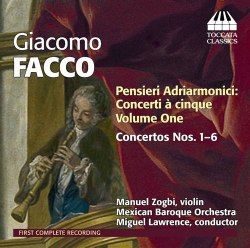|

Support us financially by purchasing
this disc through MusicWeb
for £10.50 postage paid world-wide.

|
Giacomo FACCO (1676-1753)
Pensieri Adriarmonica - Volume 1
Concerto à 5, Op.1, Nos. 1-6 (c. 1716) [51:48]
Manuel Zogbi (violin)
Mexican Baroque Orchestra/Miguel Lawrence
rec. April 2013, DMY Studio, Monterrey
TOCCATA CLASSICS TOCC 0202 [51:48]
The very entertaining booklet notes relate the investigative work necessary to find out biographical details regarding Italian composer Giacomo Facco. I won’t spoil the twists and turns here, though it will be helpful to place Facco in the continuum of the emergent Italian concerto school of the eighteenth-century. He was born in 1676 near Venice and had moved to Sicily, thence travelling to the Spanish Court to perform in the Royal Chapel. A decision not to move to Lisbon to further the musical education of the Portuguese King’s daughter seems to have had regrettable consequences when she later married into the Spanish royal family and became Queen. The man who had accepted the job that Facco rejected was none other than Domenico Scarlatti. His arrival with the new, seemingly vindictive Queen sealed Facco’s fate. Facco’s salary was frozen and even after his death in 1753 his pension was withheld from his widow.
Facco wrote a considerable amount of vocal and operatic music. His major work however is the Pensieri Adriarmonica of which the first volume can be heard in Toccata’s release. These instrumental concertos form a second or third generation of the emergent form that had begun with Torelli in Bologna, developed through Corelli in Rome, and moved onwards via composers such as Locatelli and Valentini. The three-movement model established by Albinoni was cross-fertilised with Vivaldi’s genius at ritornelli and the opportunity for solo virtuosity. Facco shows clear signs of having absorbed Vivaldian models. It’s surely no coincidence that his set of concerti was published just a few years after Vivaldi’s L’Estro Armonico.
The concertos were rediscovered in a Mexican library in 1962 and thus began the hunt for information about a composer who had largely disappeared from historical record. Given their final resting place this recording employs a basso continuo of vihuela and guitarrón, two instruments that lend a distinctly local colour. It’s speculated that these instruments, which originated in Mexico, were used to play basso continuo in Baroque works during colonial years. The Mexican Baroque Orchestra - two violins, viola, and cello under the direction of harpsichord player Miguel Lawrence - plays on modern instruments, as does the violin soloist Manuel Zogbi, but what is being sought here is a distinctive Mexican sound. Certainly the continuo instruments offer rich sonority.
What also sounds distinctive is the very athletic, vigorous and unshrinking playing of Manuel Zogbi. He plays the sonata da chiesa third movement of the first concerto with sonorous confidence aided by the small band, which sounds commendably rich in ensemble passages. Facco often favoured accompanying orchestral staccati in slow movements over which Zogbi spins a cantilena, as in the second concerto, warmed by the kind of fulsome vibrato that some may find overdone in this music. His constant changes of colour certainly vest the music with great interest. Facco inherited an astute concern for fugal interplay and much is predicated on Vivaldian lines in these concerti - so too, for that matter, is a fine sense of the solo instrument’s potential for aria-like projection, as exemplified in the third concerto’s very brief Adagio. The Saltarello in its finale sounds very much like one of the older concerto grosso models that Facco assuredly knew, though it’s actually a concerto ripieno. The fourth concerto is a slightly more extended one, certainly compared with the third, and sports a rather beautiful slow movement, to which Zogbi brings his big tone and emotive faculties. The technical advances Vivaldi established between solo and ritornello are reprised by Facco most successfully in the sixth of the set, a delightfully constructed work in which the solo violin heavily decorates the slow movement. I’m not sure whether it’s the recording level or Zogbi, or both, but I suspect that more dynamic variance, and softer playing, might have enhanced the expressive potential still further.
If you’re looking to discover a post-Vivaldi, post-Albinoni Venetian composer who has slipped History’s moorings then Facco is a useful composer to discover. The question of the rediscovery of his music is also fascinating and, as noted, the booklet is very well worth reading. Facco was an inheritor, not an innovator, but within those limits his concertos, spiced by the Mexican basso continuo, offer ear-catching listening.
Jonathan Woolf
|



 All Nimbus reviews
All Nimbus reviews








